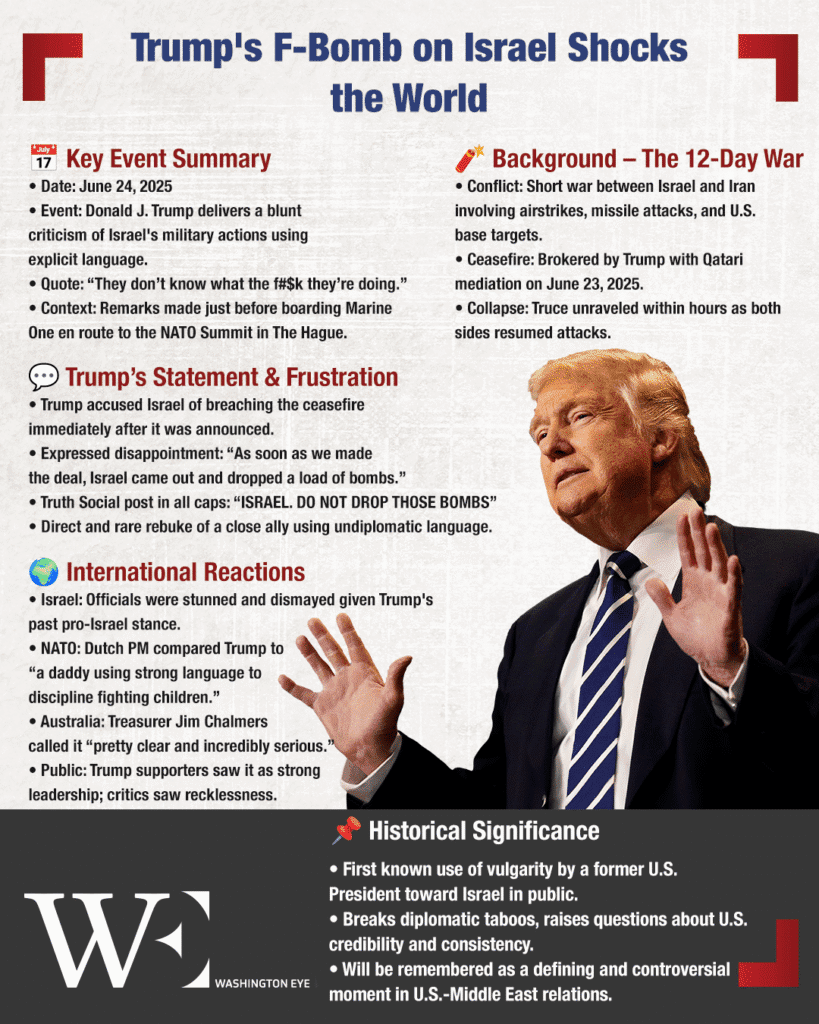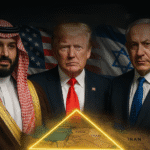by: The Washington Eye
In a stunning and unprecedented outburst, former U.S. President Donald J. Trump publicly condemned Israel’s military actions using explicit language, saying “they don’t know what the f#%k they’re doing,” during a press conference on June 24, 2025. The statement came amid rising tensions between Israel and Iran following a short-lived ceasefire deal that Trump had personally helped broker. The crude remark, made on live television just before Trump boarded Marine One to attend the NATO summit in The Hague, marked the first time a U.S. president—former or sitting—used such vulgar language against one of America’s closest allies. It sent shockwaves across diplomatic circles and prompted widespread international reaction.
The outburst followed what Trump dubbed the “12-Day War” between Israel and Iran, which saw escalating violence including Israeli airstrikes on Iranian facilities and Iranian missile attacks in response, some of which targeted a U.S. military base in Qatar. Trump intervened as a mediator and announced a temporary ceasefire on June 23, brokered in part through Qatari channels. However, within hours, the truce crumbled. Trump blamed both Israel and Iran for violating the agreement, but his frustration toward Israel was especially blunt and vocal. “As soon as we made the deal, Israel came out and dropped a load of bombs. I’m not happy with Israel,” he stated, before delivering the expletive-laced assessment of both sides’ actions.
While Trump has long been known for breaking political norms and using strong rhetoric, this moment stood out for its timing, content, and context. It is exceedingly rare for any American president to directly and publicly criticize Israel—let alone in such graphic terms. Historically, U.S. presidents have gone to great lengths to support Israel diplomatically, even while expressing private concerns over its military actions. Trump’s outburst not only breached traditional diplomatic decorum but also risked straining one of the most strategically significant alliances in the Middle East.
The reaction was swift. Israeli officials were reportedly stunned and dismayed by the harsh tone of the comments, especially coming from Trump, who during his presidency was seen as one of Israel’s strongest allies, having moved the U.S. embassy to Jerusalem and supported key Israeli policies. Media in both Israel and the U.S. highlighted the unprecedented nature of the rebuke. At the NATO summit, Dutch Prime Minister and NATO Secretary-General Mark Rutte compared Trump to “a daddy using strong language to discipline fighting children,” while Australia’s Treasurer Jim Chalmers described the moment as “pretty clear and incredibly serious.” On social media, Trump’s supporters hailed the comment as a sign of tough leadership, while critics argued it reflected recklessness and diplomatic irresponsibility.
This moment was not just about language—it carried real geopolitical implications. Trump’s anger stemmed from what he saw as an intentional Israeli breach of the ceasefire agreement he had helped craft, which he believed undermined U.S. efforts to prevent a broader regional war. He took to Truth Social, posting in all caps: “ISRAEL. DO NOT DROP THOSE BOMBS,” a direct and unusually public directive to a sovereign ally. It signaled Trump’s growing frustration with Israel’s aggressive tactics, especially when they threatened to pull the United States deeper into conflict.
Analysts are debating whether Trump’s words will have any lasting impact. On one hand, the statement might pressure Israel to consider its military posture more carefully, especially given the backlash from even its most reliable partners. On the other hand, it may deepen divisions between Trump’s brand of American diplomacy and the traditional U.S. foreign policy establishment. While Trump is no longer in office, his statements still command attention worldwide and may influence public opinion or even future policy should he return to power.
Ultimately, Trump’s use of the F-word against Israel marked a new chapter in U.S.-Middle East relations—a moment when long-standing diplomatic filters were dropped in favor of raw emotion and blunt messaging. It underscored not just his frustration over the failed ceasefire but also his willingness to call out even America’s closest allies when they defy his deals. Whether seen as a bold act of candor or a dangerous display of undiplomatic behavior, the moment will likely be remembered as one of the most extraordinary episodes in modern American political history.
















